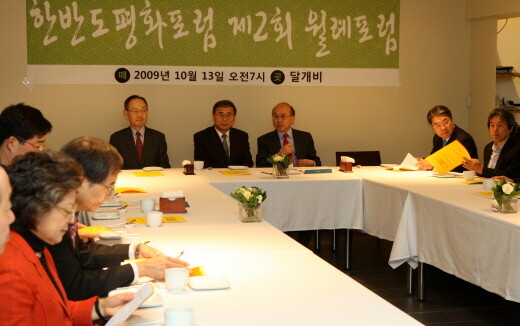hankyoreh
Links to other country sites 다른 나라 사이트 링크
Former Unification Minister Lee Jong-seok says time to send an envoy to North Korea

“In consideration of the trend towards expanding economic ties between North Korea and China, the strategic activation of inter-Korean economic cooperation is essential.”
At the second monthly “Korea Peace Forum” meeting held at the Dalgaebi Restaurant in Seoul’s Jongno-gu on Tuesday, former Unification Minister Lee Jong-seok stressed this idea in a presentation on the path of inter-Korean relations under the North Korea nuclear issue. Lee noted that since Chinese Prime Minister Wen Jiabao’s two-day visit to North Korea that started on Oct. 4, a “new economic relationship” between North Korea and China has been taking shape.
In pointing to the various agreements established during Wen’s visit, including agreements addressing economic aid, economic exchanges and tourism, Lee said the China-North Korea economic cooperation agreement could be interpreted as multi-directional and the most comprehensive agreement reached since the collapse of the socialist bloc and the beginning of the post-Cold War period. In discussing the background to the new China-North Korean economic relationship, Lee said China’s strategic keynote was to actively draw North Korea into the international community rather than isolate it and to help it develop economically through economic cooperation with the outside, while simultaneously luring it to abandon nuclear weapons.
Lee said if the six-party talks resume, North Korea is likely to use its economic agreement with China to once again push their own economic development strategy, which has been put on hold since 2000. Lee added that China will likely provide active assistance.
The problem lies in how the South Korean government will respond to an increase in China’s influence on North Korea’s economy. Lee says Seoul must plan to activate inter-Korean economic cooperation to prevent South Korea from becoming secondary in North Korea’s future and to remain a leading influence. He stressed that inter-Korean economic cooperation is not only the bedrock of reducing inter-Korean tensions and facilitating joint-prosperity, but it is also a way out for South Korea’s labor-intensive traditional industries, which are now experiencing difficulties.
Lee said it is important to use Wen’s visit to plan to launch a new approach to inter-Korean relations, and to use the trust gained from this to secure the influence to persuade North Korea back to the six-party talks. Lee added that this was the perfect opportunity to send a special envoy to North Korea.
At the forum, former Unification Minister Lim Dong-won said North Korea had sped up nuclear development because the Bush administration had applied pressure and sanctions, and the argument that pressure has yielded positive results or the idea that positive results warrant continued pressure and sanctions is very mistaken. To observers, Lim’s comments are heard as a refutation of the claims made by the Lee Myung-bak administration and conservatives that North Korea is yielding to sanctions and returning to talks.
Please direct questions or comments to [englishhani@hani.co.kr]
Editorial・opinion
![[Guest essay] The real reason Korea’s new right wants to dub Rhee a founding father [Guest essay] The real reason Korea’s new right wants to dub Rhee a founding father](https://flexible.img.hani.co.kr/flexible/normal/500/300/imgdb/original/2024/0423/8317138574257878.jpg) [Guest essay] The real reason Korea’s new right wants to dub Rhee a founding father
[Guest essay] The real reason Korea’s new right wants to dub Rhee a founding father![[Column] ‘Choson’: Is it time we start referring to N. Korea in its own terms? [Column] ‘Choson’: Is it time we start referring to N. Korea in its own terms?](https://flexible.img.hani.co.kr/flexible/normal/500/300/imgdb/original/2024/0423/3617138579390322.jpg) [Column] ‘Choson’: Is it time we start referring to N. Korea in its own terms?
[Column] ‘Choson’: Is it time we start referring to N. Korea in its own terms?- [Editorial] Japan’s rewriting of history with Korea has gone too far
- [Column] The president’s questionable capacity for dialogue
- [Column] Are chaebol firms just pizza pies for families to divvy up as they please?
- [Column] Has Korea, too, crossed the Rubicon on China?
- [Correspondent’s column] In Japan’s alliance with US, echoes of its past alliances with UK
- [Editorial] Does Yoon think the Korean public is wrong?
- [Editorial] As it bolsters its alliance with US, Japan must be accountable for past
- [Guest essay] Amending the Constitution is Yoon’s key to leaving office in public’s good graces
Most viewed articles
- 1[Editorial] Japan’s rewriting of history with Korea has gone too far
- 2Samsung barricades office as unionized workers strike for better conditions
- 3[Column] ‘Choson’: Is it time we start referring to N. Korea in its own terms?
- 4Why Korea shouldn’t welcome Japan’s newly beefed up defense cooperation with US
- 5[Column] The clock is ticking for Korea’s first lady
- 6[Guest essay] The real reason Korea’s new right wants to dub Rhee a founding father
- 7Korean government’s compromise plan for medical reform swiftly rejected by doctors
- 8[Reporter’s notebook] Did playing favorites with US, Japan fail to earn Yoon a G7 summit invite?
- 9[Column] The president’s questionable capacity for dialogue
- 10Senior doctors cut hours, prepare to resign as government refuses to scrap medical reform plan